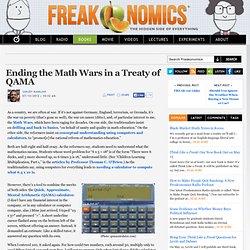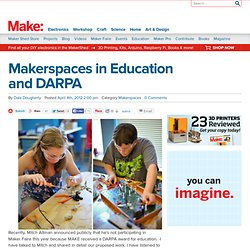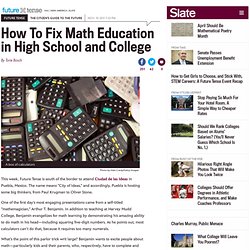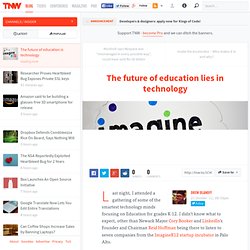

Math Anxiety Causes Trouble For Students As Early As First Grade. Is Algebra Necessary? My question extends beyond algebra and applies more broadly to the usual mathematics sequence, from geometry through calculus. State regents and legislators — and much of the public — take it as self-evident that every young person should be made to master polynomial functions and parametric equations. There are many defenses of algebra and the virtue of learning it. Most of them sound reasonable on first hearing; many of them I once accepted. But the more I examine them, the clearer it seems that they are largely or wholly wrong — unsupported by research or evidence, or based on wishful logic. (I’m not talking about quantitative skills, critical for informed citizenship and personal finance, but a very different ballgame.) This debate matters. The toll mathematics takes begins early. Shirley Bagwell, a longtime Tennessee teacher, warns that “to expect all students to master algebra will cause more students to drop out.”
Another dropout statistic should cause equal chagrin. Ending the Math Wars in a Treaty of QAMA. As a country, we are often at war.

If it’s not against Germany, England, terrorism, or Grenada, it’s the war on poverty (that’s gone so well), the war on cancer (ditto), and, of particular interest to me, the Math Wars, which have been raging for decades. On one side, the traditionalists insist on drilling and back to basics, “on behalf of sanity and quality in math education.” On the other side, the reformers insist on conceptual understanding using computers and calculators, to “promot[e] the rational reform of mathematics education.” Both are half-right and half-crazy. As the reformers say, students need to understand what the mathematics means. (Photo: qamacalculator.com) Makerspaces in Education and DARPA. Recently, Mitch Altman announced publicly that he’s not participating in Maker Faire this year because MAKE received a DARPA award for education.

I have talked to Mitch and shared in detail our proposed work. I have listened to him express his concerns about the DARPA award. I don’t agree with Mitch, but I respect his opinion. I believe that Mitch’s public statements do not fairly characterize the program and have caused confusion about DARPA’s role. Mathemagician Vi Hart Explains the Science of Sound, Frequency and Pitch. Math education: How colleges and high schools can fix it. Photo by Matt Cardy/Getty Images This week, Future Tense is south of the border to attend Ciudad de las Ideas in Puebla, Mexico.

The name means “City of Ideas,” and accordingly, Puebla is hosting some big thinkers, from Paul Krugman to Oliver Stone. One of the first day’s most engaging presentations came from a self-titled “mathemagician,” Arthur T. Benjamin. In addition to teaching at Harvey Mudd College, Benjamin evangelizes for math learning by demonstrating his amazing ability to do math in his head—including squaring five-digit numbers. What’s the point of this parlor trick writ large? Another speaker at Ciudad de las Ideas today, NYU professor of psychology Gary Marcus, argued that schools should focus less on teaching facts—which can be easily ascertained from Google—and more on teaching them how to think. One of the primary problems with math education today, according to Benjamin, is that the sequence of courses leads students in the wrong direction. Is College Science Just Too Darned Hard? It's a time-honored practice for politicians and educators to wring their hands over how American students have fallen behind in science and technology.

Many have pointed out how large class sizes, lackluster teachers, and non-challenging curriculum in elementary and high schools are shortchanging our students and (gasp!) The country's future global competitiveness. But who's really at fault here? Could the problem actually be on the shoulders of the vaunted American colleges and universities? Christopher Drew wrote an intriguing article for The New York Times that examine how more and more students are turned off by science at the college level: How to Fix Our Math Education. The 50 Best Blogs for STEM Educators. Posted on Tuesday October 18, 2011 by Staff Writers Ever since the Cold War, American schools have placed almost all their eggs in the STEM education basket.

Successes in science, technology, engineering and mathematics are held up as the pinnacle of academic — if not human — achievement. As a result, teachers with a particular proficiency in these umbrella fields enjoy high demand. So if they want to remain competitive, maintaining awareness of the latest changes, news, discoveries, policies and more is absolutely essential. Blogs provide them a quick and easy conduit for connecting with their fellow STEMs, both inside and outside the education sector. Science ScienceBlogsNo matter the scientific discipline, at least one of these resources covers it. The future of education lies in technology.
Last night, I attended a gathering of some of the smartest technology minds focusing on Education for grades K-12.

I didn’t know what to expect, other than Newark Mayor Cory Booker and LinkedIn‘s Founder and Chairman Reid Hoffman being there to listen to seven companies from the ImagineK12 startup incubator in Palo Alto. In a small office within the Palo Alto aol building, teams with big hearts (and sometimes very nervously) discussed their views on the future of Education for children all over the world. Is College Science Just Too Darned Hard?